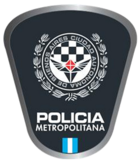Buenos Aires Metropolitan Police: Difference between revisions
GreenC bot (talk | contribs) m 1 archive template merged to {{webarchive}} (WAM) |
Fred Miltons (talk | contribs) No edit summary |
||
| Line 37: | Line 37: | ||
|aircraft1type = |
|aircraft1type = |
||
|aircraft1 = |
|aircraft1 = |
||
|website = [http://www.metropolitana. |
|website = [http://www.metropolitana.gob.ar/ www.metropolitana.gob.ar] |
||
|footnotes = |
|footnotes = |
||
}} |
}} |
||
The '''Metropolitan Police''' |
The '''Metropolitan Police''' was the police force under the authority of the Autonomous City of [[Buenos Aires]] until it's merging with the city's division of the [[Argentine Federal Police]] by creating the [[Buenos Aires City Police]].<ref>http://www.buenosairesherald.com/article/206124/macri-larreta-arrange-federal-police-transfer-to-city-scope</ref>. The force was created in 2010 and is composed of 1,850 officers, and is planned to expand to 16,000. Security in the city is concurrently the responsibility of the Metropolitan Police and the [[Argentine Federal Police]]. |
||
The city government claims the new force is based on the model of the [[United Kingdom|British]] [[London]] [[Metropolitan Police]] and the [[New York Police Department]]. The force was intended to use high technology support and adopt a policy of [[zero tolerance]]. |
The city government claims the new force is based on the model of the [[United Kingdom|British]] [[London]] [[Metropolitan Police]] and the [[New York Police Department]]. The force was intended to use high technology support and adopt a policy of [[zero tolerance]]. |
||
Revision as of 04:08, 14 January 2017
| Buenos Aires Metropolitan Police Policía Metropolitana de Buenos Aires | |
|---|---|
 | |
| Motto | Una policía integrada a la comunidad A police corp integrated to the community |
| Agency overview | |
| Formed | 2008 |
| Preceding agency |
|
| Employees | 4,000 |
| Jurisdictional structure | |
| Operations jurisdiction | Buenos Aires |
| General nature | |
| Operational structure | |
| Elected officer responsible |
|
| Agency executive |
|
| Divisions | Security, Investigation, Scientific, Technical |
| Facilities | |
| Stations | 4 [1] |
| Website | |
| www.metropolitana.gob.ar | |
The Metropolitan Police was the police force under the authority of the Autonomous City of Buenos Aires until it's merging with the city's division of the Argentine Federal Police by creating the Buenos Aires City Police.[2]. The force was created in 2010 and is composed of 1,850 officers, and is planned to expand to 16,000. Security in the city is concurrently the responsibility of the Metropolitan Police and the Argentine Federal Police.
The city government claims the new force is based on the model of the British London Metropolitan Police and the New York Police Department. The force was intended to use high technology support and adopt a policy of zero tolerance.
Structure and Organization of the Metropolitan Police
The police are headed by a Chief and a Deputy Chief. Both are appointed by the head of the executive branch of the City.
There are four major departments, each headed by a Director General:
- Public Security
- Investigations and Research
- Scientific and Technical
- Administration
Geographically, the force is divided into 15 precincts.
Of the 1,850 officers, 900 are used for patrolling the streets.
Ranks
The Metropolitan Police use nine ranks, the highest being "Superintendent".[3]
- Officer
- Senior Officer
- Sub-Inspector
- Inspector
- Sub-Commissioner
- Commissioner
- Senior Commissioner
- Commissioner-General
- Superintendent
Controversy
There has been little controversy surrounding its officers, primarily due to its "zero-tolerance" policy, officers are sometimes violent against protesters and tend to use excessive force. However, the department has managed to boost its reputation. Civilians often tend to choose the Metropolitan Police over the Federal Police, due to high levels of corruption in that country's Federal Police.
Notes
- ^ Map of Police stations in the city of Buenos Aires Archived July 27, 2013, at the Wayback Machine, retrieved 18 November 2013
- ^ http://www.buenosairesherald.com/article/206124/macri-larreta-arrange-federal-police-transfer-to-city-scope
- ^ http://www.buenosaires.gov.ar/areas/seguridad_justicia/policia_metropolitana/estructura_organizacion.php?menu_id=29494
See also
- Metropolitan Police
- Guardia Urbana de Buenos Aires
- Argentine Federal Police
- Buenos Aires Police
- Santa Fe Province Police
- Interior Security System
